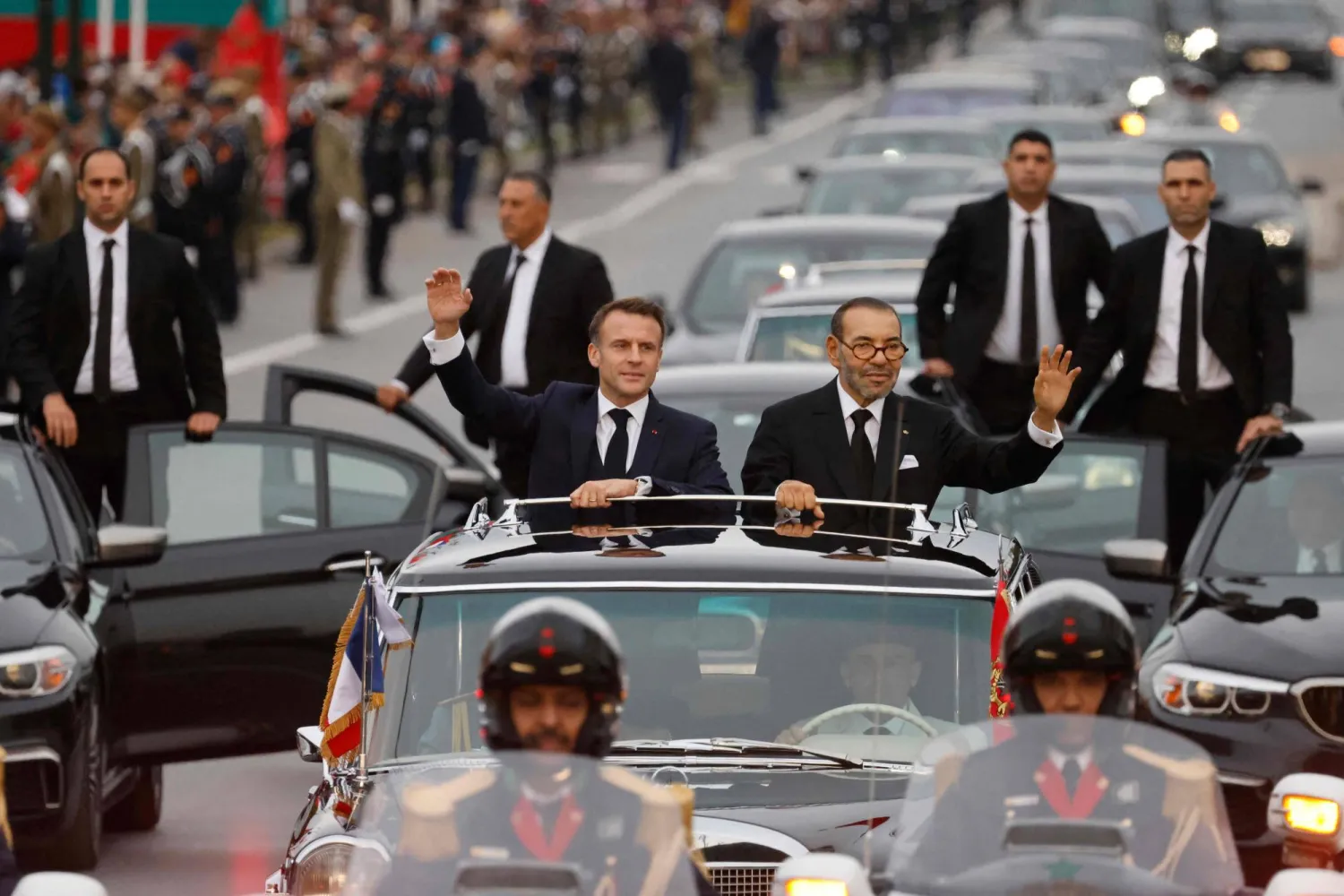Morocco's King Mohammed VI welcomed French President Emmanuel Macron to Morocco on Monday, kicking off a state visit with a series of bilateral agreements, including major investments in renewable energy and transportation.
Macron's trip to Morocco — his first in six years — comes as immigrants, including North Africans, face continued scrutiny in France and while France reassesses its role in its former colonies throughout Africa. Morocco has historically been a key economic and security partner, however relations between the two countries have often been fragile, The Associated Press said.
Among the objectives of Macron's visit, the Elysee Palace said, is “to rebuild the exceptional partnership that links our two countries.”
French and Moroccan flags on Monday flew throughout the capital, where crowds lined the streets to watch the motorcade containing Macron, his wife and members of Morocco's royal family drive to one of their palaces.
Macron and Mohammed VI, who used a cane to walk, later oversaw a ceremonial signing of 22 agreements to facilitate future investments as well as cultural and scientific partnerships. The investments are worth a total of 10 billion euros and include expanding Morocco's high speed rail line southward to Marrakech, which the country hopes to complete before it holds events for the FIFA World Cup in 2030. They also included projects to develop green hydrogen, wind farms and water projects, which Morocco has identified to help insulate the country from the effects of climate change.
In the days leading up to the visit, Moroccan publications lauded the “warm reunion” and a “new honeymoon” between the two countries.
Diplomatic relations have warmed. Macron changed France’s longstanding public position and backed Morocco’s autonomy plan for the disputed Western Sahara. Doing so endeared France to Morocco but alienated it from Algeria, which hosts refugee camps governed by the pro-independence Polisario Front and considers Morocco an occupying power.
France and Morocco have historically partnered on issues ranging from counterterrorism to managing migration. Morocco is the top destination for French investment in Africa and France is Morocco’s top trade partner. Morocco imports French cereals, weapons and renewable energy infrastructure like turbines. France imports goods from Morocco including tomatoes, cars and airplane parts.
Moroccans are among the largest foreign-born communities in France, where North African immigrants are a key political constituency and a focal point of debates about the roles of Islam and immigration in French society.
France’s new Interior Minister Bruno Retailleau, a member of the French delegation in Morocco this week, has pushed for the country to take a hard-line approach toward immigration and seek deals with countries like Morocco to better prevent would-be migrants from crossing into Europe.
On Macron’s last visit to Morocco, he and King Mohammed VI inaugurated Al Boraq, Africa’s first high-speed rail line, made possible by French financing and trains manufactured by the French firm Alstrom. The rail line currently functions from central to northern Morocco, running high speed from Kenitra to Tangiers. The extension will more than double its length.
Despite close ties, relations have at times been fragile between France and Morocco, which was a French protectorate from 1912 to 1956. In 2021, Morocco suspended consular relations after France momentarily reduced the number of visas offered to Moroccans in protest of its refusal to provide documents needed to deport people who migrated to France without authorization. France later reversed the decision.
Relations between the two countries soured further that year, when a 2021 report revealed Morocco’s security services had used Israeli spyware to infiltrate the devices of activists and politicians, including Macron. Morocco denied and sued over the allegations.
France and Morocco Announce High Speed Rail Investments as Macron Visits Rabat

Morocco's King Mohammed VI (R) and France's President Emmanuel Macron greet the crowds as the drive down a road in the capital Rabat on October 28, 2024. (Photo by Ludovic MARIN / POOL / AFP)

France and Morocco Announce High Speed Rail Investments as Macron Visits Rabat

Morocco's King Mohammed VI (R) and France's President Emmanuel Macron greet the crowds as the drive down a road in the capital Rabat on October 28, 2024. (Photo by Ludovic MARIN / POOL / AFP)
لم تشترك بعد
انشئ حساباً خاصاً بك لتحصل على أخبار مخصصة لك ولتتمتع بخاصية حفظ المقالات وتتلقى نشراتنا البريدية المتنوعة







